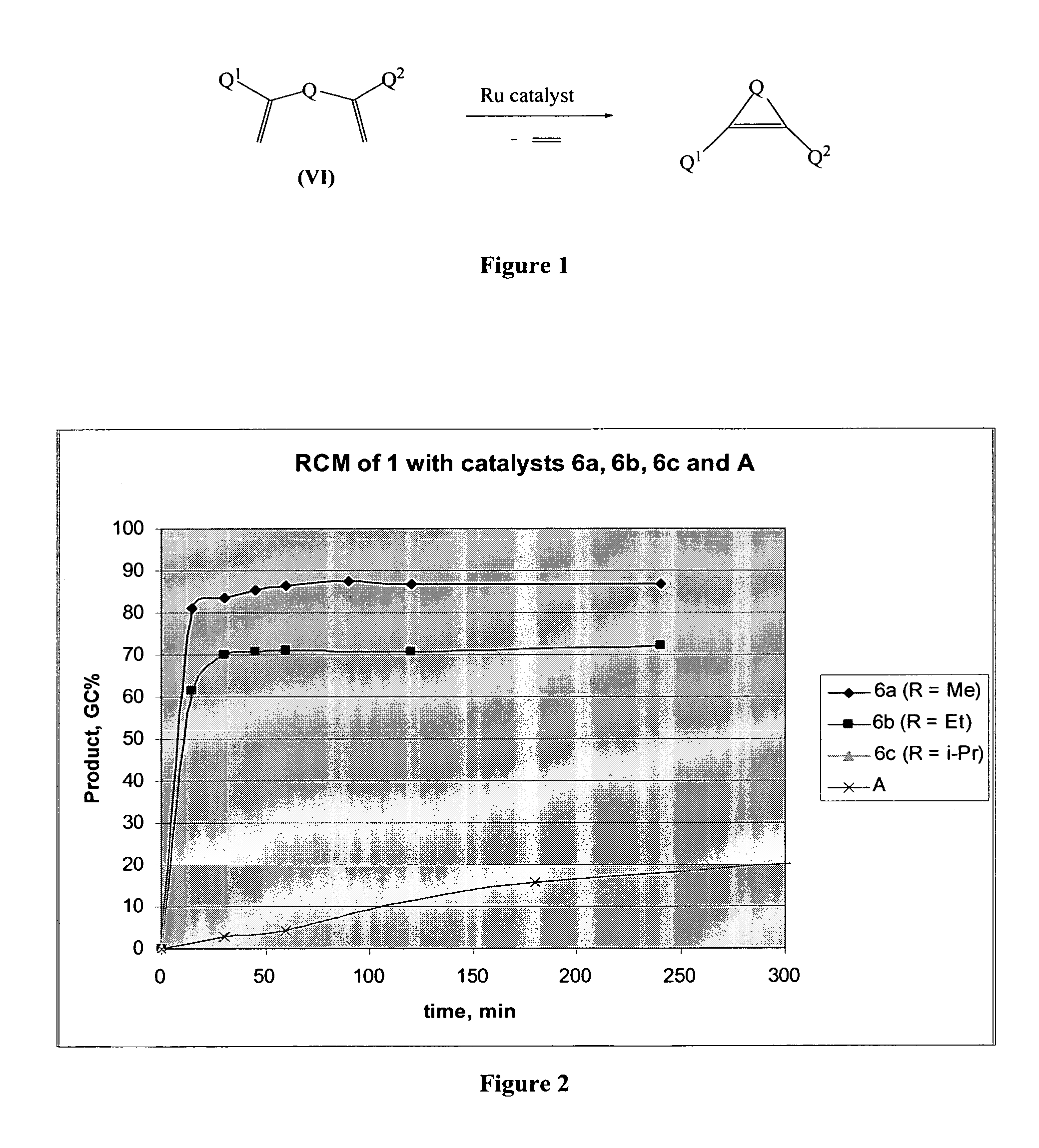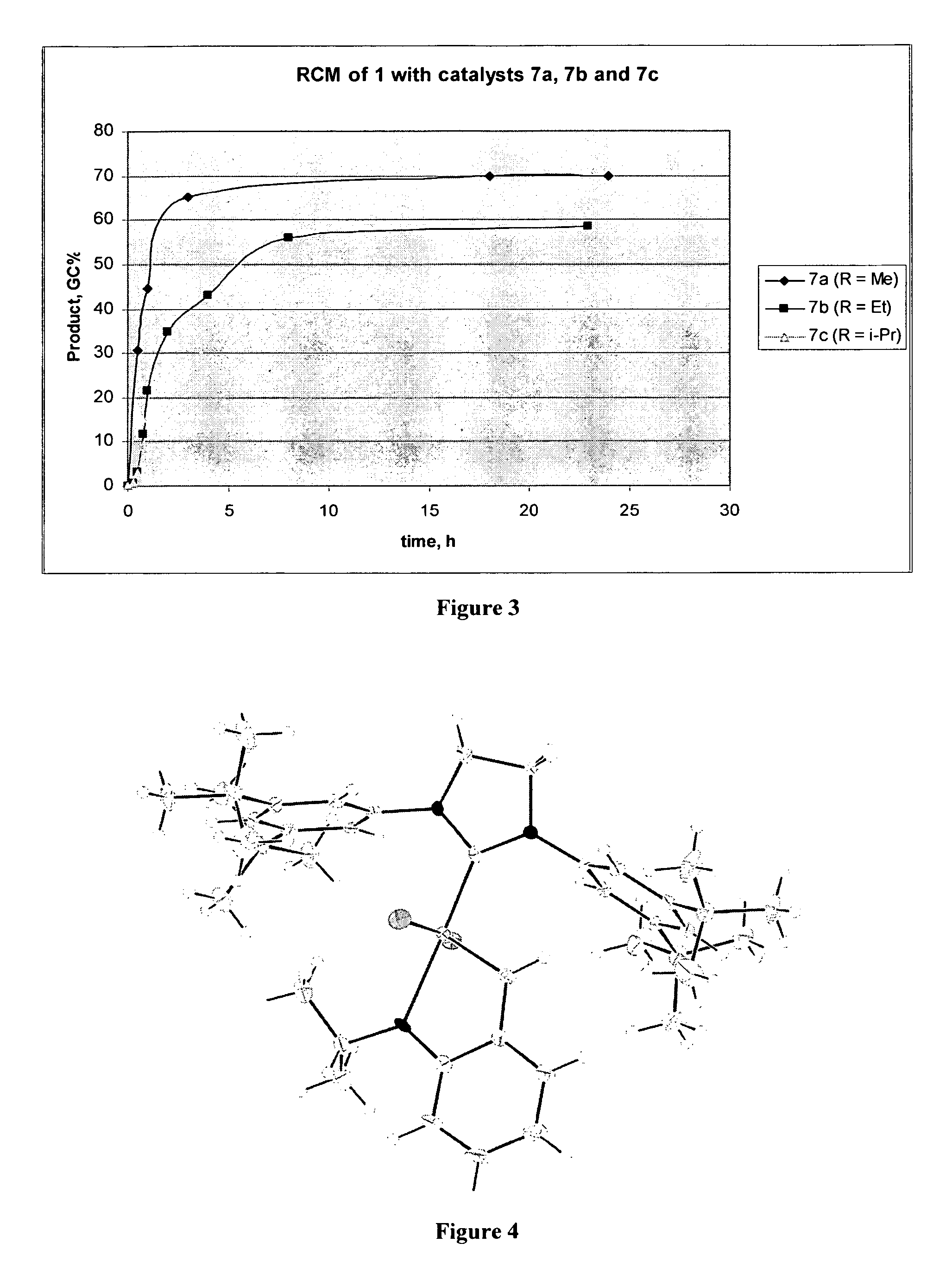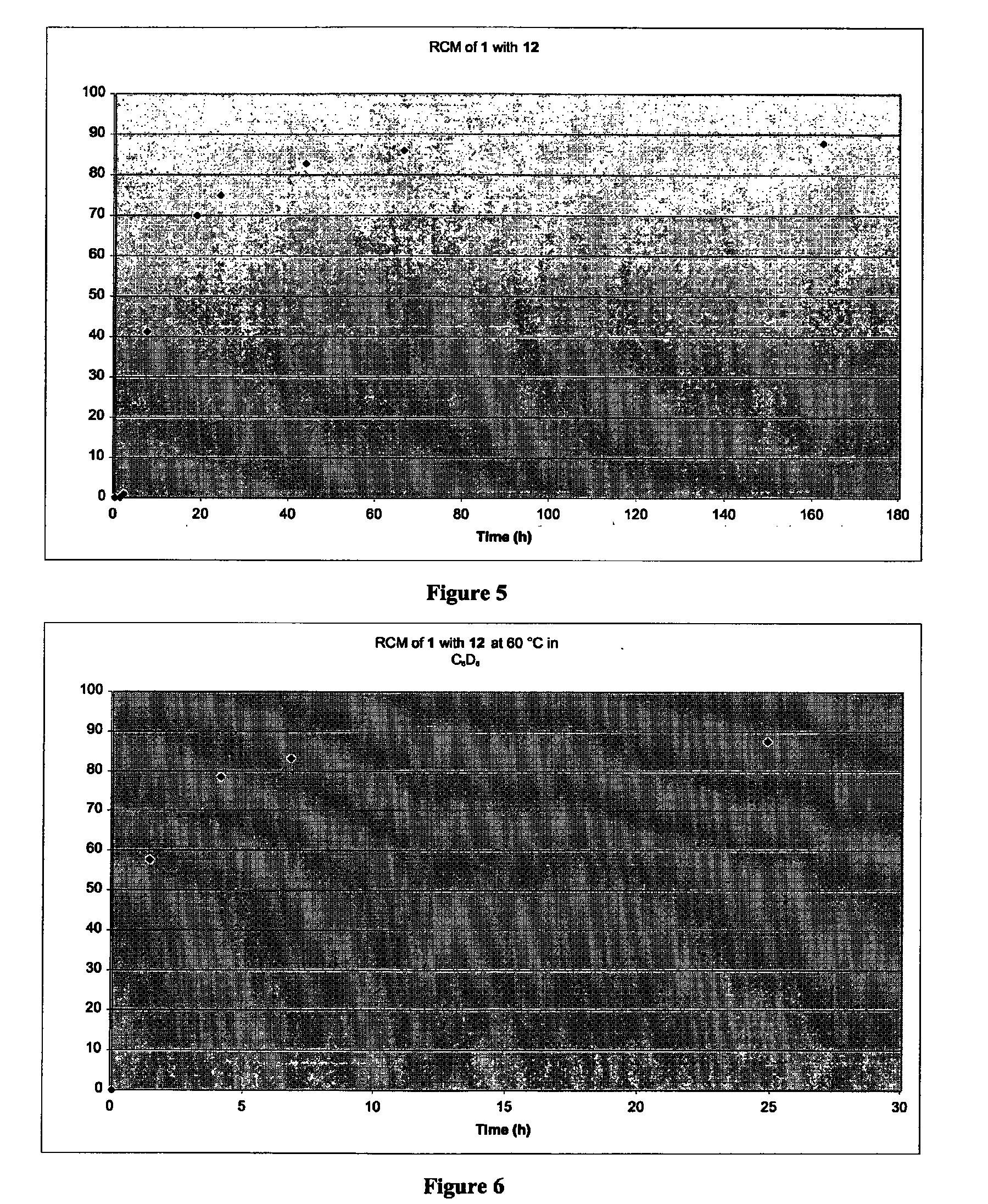Organometallic ruthenium complexes and related methods for the preparation of tetra-substituted and other hindered olefins
a technology of organic ruthenium complexes and hindered olefins, which is applied in the field of organic ruthenium complexes and olefin metathesis methods, can solve the problems of difficult metathesis of hindered olefins, low to moderate yield, and low activity of bisphosphine complexes
- Summary
- Abstract
- Description
- Claims
- Application Information
AI Technical Summary
Benefits of technology
Problems solved by technology
Method used
Image
Examples
example 1
Ortho Substituted NHC Ligand Synthesis
[0085]
[0086]General procedure for the preparation of N,N′-Diaryl oxamides. Oxalyl chloride (4.36 mL, 50 mmol) was added dropwise to a stirred solution of aniline C6H4RNH2 (100 mmol, 2 equiv) and base (100 mmol, 2 equiv) in THF (200 mL) at 0° C. Triethylamine or aq. NaOH may be used as bases for this reaction. Upon addition, the reaction was allowed to warm up to room temperature (r.t.) and stirred for 1 h. The reaction mixture was then concentrated in vacuo and diluted with water (100 mL). The white precipitate was collected by filtration, washed with dilute HCl (100 mL), water (2×100 mL), and dried in vacuo. The following N,N′-diaryl oxamides were prepared by this procedure:
[0087]N,N′-Bis(o-tolyl) oxamide. Obtained in a 98% yield as a white solid. 1H NMR (300 MHz, CDCl3): δ 9.38 (s, 2H), 8.09 (d, 3JHH=7.8 Hz, 2H), 7.31-7.12 (m, 6H), 2.39 (s, 6H).
[0088]N,N′-Bis(2-ethylphenyl)oxamide. Obtained in a 71% yield as a white solid.
[0089]N,N′-Bis(2-isop...
example 2
Catalyst Synthesis
[0098]
[0099]General procedure for the preparation of ortho-substituted catalyst 6. Potassium bis(trimethylsilyl)amide (1.4 g, 7.0 mmol, 1.23 equiv) was added to a suspension of dihydroimidazolium salt 4 (compound 4 of reaction scheme 3) (2.3 g, 6.7 mmol, 1.15 equiv) in toluene (57 mL) under argon. The reaction mixture was stirred at r.t. for 30 min, then compound 5 (4.7 g, 5.7 mmol) was added and stirring was continued for 1.5 h at r.t. The reaction mixture was then concentrated and catalyst 6 was isolated by column chromatography and dried in vacuo. The ortho-substituted catalysts were prepared by this procedure:
[0100]Catalyst 6a (i.e. compound 6 wherein R=methyl). Obtained in a 66% yield after column chromatography on silica gel (unreacted 5 was first eluted with 1:9 EtOAc-hexanes, then 6a was eluted with 1:3 EtOAc-hexanes). Brown crystalline solid. 1H NMR (300 MHz, C6D6): δ 19.61 (s), 8.70 (br), 7.64 (br), 7.31-6.76 (m), 6.59 (m), 6.34 (br), 3.53-3.01 (m), 2.62 ...
example 3
Catalyst Performance in RCM
[0107]
[0108]Ring-closing metathesis of dimethyl 2,2-di(2-methylallyl)malonate. Catalyst was added to a 0.1 M solution of dimethyl 2,2-di(2-methylallyl)malonate in CH2Cl2 in a round bottom (r.b.) flask. The flask was equipped with a reflux condenser and a bubbler outlet. The reaction mixture was sparged with argon for 5 min, then heated to desired temperature. Reaction progress was monitored by GC analysis of aliquots after removing the catalyst by treating the aliquot with 1M solution of THMP in IPA, heating the quenched mixture at 60° C. for 1 h, diluting it with water and extraction with EtOAc. The activity of catalysts of the invention were compared with the olefin metathesis catalyst (A) shown below:
[0109]
TABLE 3ARCM of dimethyl 2,2-di(2-methylallyl) malonatewith 5 mol % of A at 40° C.Time (min)Starting Material (GC %)Product (GC %)3091.93.06092.44.218084.315.7108049.744.7144042.449.8252038.154.5
[0110]
TABLE 4RCM of dimethyl 2,2-di(2-methylallyl)malonat...
PUM
| Property | Measurement | Unit |
|---|---|---|
| temperature | aaaaa | aaaaa |
| temperature | aaaaa | aaaaa |
| temperature | aaaaa | aaaaa |
Abstract
Description
Claims
Application Information
 Login to View More
Login to View More - R&D
- Intellectual Property
- Life Sciences
- Materials
- Tech Scout
- Unparalleled Data Quality
- Higher Quality Content
- 60% Fewer Hallucinations
Browse by: Latest US Patents, China's latest patents, Technical Efficacy Thesaurus, Application Domain, Technology Topic, Popular Technical Reports.
© 2025 PatSnap. All rights reserved.Legal|Privacy policy|Modern Slavery Act Transparency Statement|Sitemap|About US| Contact US: help@patsnap.com



